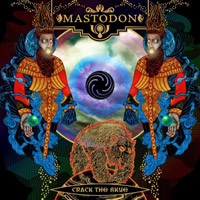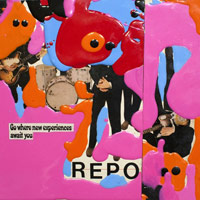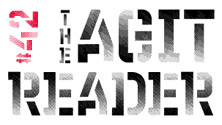
Jewellery
Rough Trade
The way music is quickly lapped up and just as expediently spit out these days, it’s hard to be truly caught off-guard. But the debut from Londoners Micachu and the Shapes, a.k.a. singer and songwriter Mica Levi accompanied by Raisa Kahn (keys) and Marc Pell (drums), is just such a leftfield punch to the ear. The trio has stripped off all the bullshit coating contemporary music and applied a lacquer of its own making. At its heart, what the band does is very basic, a sort of post-modern skiffle built around Mica’s beat-up guitar and dodgy vocals. With more rhythm than melody emitted from Levi’s makeshift six-string, her Shapes—as the band name implies—provide a semblance of form, a buzzing swirl of synth and knocked beats encircling Mica’s puckish truisms on life, music and sex (but not necessarily in that order, of course).
Jewellery lurches and lays back in all the right places, Micachu seemingly equally comfortable frantically reconfiguring a groove as slowly picking apart a pop song. It begins with the former on “Vulture,” an atonal guitar riff playing off machinated handclaps and synth whines. “Lips” and “Sweetheart” work somewhat dissimilarly, hen-scratched licks scrunched between walls of fuzz saturation. “Curly Teeth” is altogether different, starting out as squeaky clean pop reverie only to intermittently sink into a grimy marmalade. And on “Golden Phone,” the catchiest of the album’s dozen cuts, if not its high point, Micachu and her cohorts create a sunny landscape only to have it fall in on itself due to their own doing. Shapeshifters they are, capable of delicacy one minute and dissonance the next with equal salience.
Stephen Slaybaugh
MP3: “Lips”

Crack the Skye
Reprise
To be honest, it’s been easy to maintain the belief that Mastodon’s apex came and went with 2004’s Moby Dick–inspired masterpiece, Leviathan, and consequently everything that’s come after that watershed moment, namely the album’s follow-up, Blood Mountain, could be chalked up to an indulgent downward spiral. For that, I owe the Atlanta quartet an apology. It would be just as easy, upon first listen, to write off Crack the Skye as a band overestimating their ambition, forcing past a threshold of complex movements and dizzying time signatures to create something as heinously bloated as Emerson Lake and Palmer (or as technically/thematically banal as Dream Theater). Under the surface you’ll still need a legend to interpret the labyrinthine guitar exercises and the lyric sheet to make something out of their convoluted tales of Czarist Russia, but surprisingly this time around, Mastodon take great strides in making their epic prog-metal lush and listenable for the casual head unsubscribing to such lengthy, polymorphic workouts.
In lieu of the expected ballast of devastator riffs and growls that could’ve sunk Crack the Skye from the outset, Mastodon have crafted what, after more deliberate sessions with the songs, could only be described as “headphone metal.” Without the support of aural insulation, it would be impossible to discern the myriad layers of moody synth, exotic percussion and on-a-dime pivots of their playing. Blasting from the speakers of your home stereo, though, it sounds as if the band also wants to connect on initial contact, as “Oblivion” and the quadratic banjo–infused first single, “Divinations,” have scaled back the vocals to emphasize melody and trimmed run times in order to distill their hyper-heavy tropes into something resembling classic rock radio of the near future. As on the excellent “Quintessence,” a song that thrashes with equal amounts of Southern twang and Rush’s inspirational dynamics, Mastodon’s attempt at writing a catchy ode to time travel succeeds without sacrificing their puzzling technical prowess.
Still, the behemoth scope of Mastodon is best displayed when they do stretch past the 10-minute mark. “The Czar,” a four-part saga, gives credence to the theory that metal bands ought to be patterning themselves after Yes and Genesis, rather than tired heroes like Metallica and Megadeth. There’s nothing inherently wrong with that brethren, as they will likely hold the blueprint for decades to come, but if an album as both challenging and engaging as Crack the Skye becomes the new standard issue, the hesher universe will be better because of it.
Kevin J. Elliott

Now We Can See
Kill Rock Stars
When the Thermals popped up in 2003 with the scratchy post-grunge single “No Culture Icons,” lo-fi wasn’t as cool as it is now. Bands like the Strokes and Interpol were giants, cranking out exciting, polished pop singles and getting plastered all over the radio and the covers of glossy music and fashion rags. That Thermals record sounded like they’d been on whip-its when they recorded it through a boombox. That is, nothing like the Strokes or Interpol’s glimmering, expensive studio recordings, but no less exciting or vibrant.
A few records and years have passed in between “No Culture Icons” and this new record, Now We Can See, and while the band may have spent a little more on production, they haven’t lost the finger-in-the-socket pep or the hot-match-on-your-ass energy of the early singles. The Thermals could have stuck with the tinny, maxed-out microphone static, barely audible drums, and absent bass sound that is all the rage lately, but Now We Can See is more faithful (i.e. hi-fi) to their live sound. Recorded by John Congleton (Explosions in the Sky, Polyphonic Spree) as a two-piece, with Hutch Harris singing and playing guitar and Kathy Foster on both bass and drums, this record has no want for hooks or infectious melodies. Sometimes this can be a problem, if only because there are just so many hooks to swallow all at once, sort of like having too much chocolate or too much money, I guess. The band has evolved as songwriters, also. “At the Bottom of the Sea” shows that they have the ability to relax for a minute and display a little vulnerability, where the lyrics don’t have to hide behind a commanding guitar hook. The Thermals have proven that they still have the vigor of the early records yet are only getting better with age.
Michael P. O’Shaughnessy
MP3: “Now We Can See”

It’s Blitz!
Interscope
Indie darlings the Yeah Yeah Yeahs took tentative steps out of the garage that housed their debut Fever to Tell with 2006’s Show Your Bones. This time around, the New York trio takes bold strides into the dance party scene with It’s Blitz! As with the last record, the vocals of Karen O. are less Chrissie Hynde and more Siouxie Sioux, backed with a sound—courtesy of Nick Zinner and Brian Chase—that is equally reliant on keyboards as it is on guitar. What would sound like worrisome symptoms to fans of a lesser band, who might make an over-ambitious, oddball U-turn (insert your own ill-fated examples here), this is the sound a band truly evolving. Much like Sioux and her Banshees, as well as CBGB’s-turned-Studio-54 transplants Blondie, the Yeah Yeah Yeahs self-assuredly maintain their identity while heading towards pop via the dancefloor.
Kicking off with lead single “Zero,” Karen O. does that commanding/sensual thing she does so well, emitting a Robert Smith–like coo over frenetic guitars. “Heads Will Roll,” is a synth-heavy bit of retro-futurism, with Karen barking orders like, “Off with your head. Dance till you’re dead” in the vein of Crystal Castles’ “Courtship Dating” (“Heads roll back around, when skulls hit the ground”). Is decapitation on the dancefloor a new trend? Speaking of Crystal Castles, that’s the direction of the quirky-sounds of “Soft Shock” with just the right infusion of pop. “Runaway” has the vulnerability of “Maps” on a more grandiose scale, complete with violins, while “Little Shadow” slowly builds a Cocteau Twins-type of atmosphere. The Yeah Yeah Yeahs could have easily become the indie flavor of the month (or more aptly, of the crop of 2003), but they once again prove that they have a lot more in their arsenal—worthy of the exclamation point that punctuates the album’s title.
Josie Rubio

Tsar Bomba
Troubleman Unlimited
Sacred Bones
It might be a bit premature to call Nika Danilova a force to be reckoned with, but the Madison, Wisconsin native, who moonlights as Zola Jesus, does possess a voice worthy of recognition as evidenced by her two previous 7-inch diversions that pretty much cemented the barely legal chanteuse as a wolf in sheep’s clothing. These were haunting, enigmatic, doom platters that evoked everything from Suicide to Tori Amos. And even though Amos is an influence with which not many want to be associated, for Zola Jesus it is apt, as both are emotive female artists who make music bigger-than-life and in the process freak the fuck out of their male counterparts in forceful gender power shifts.
Though Danilova is the current figurehead of a femme-centric movement of solo artists composing similarly bleak and disjointed music, as Zola Jesus evolves sonically, her music has become less about a battle of the sexes as it is at war with earthen spirits and industrial debris—combining those conflicts with bewitching effect. Not surprisingly both of Zola Jesus’ new releases, New Amsterdam and Tsar Bomba, take two giant steps forward stylistically. The former, more of a collector’s item than proper release, showcases Danilova’s “hits” so far with a live band performance for WNYU. By enlisting the help of her fellow Midwesterners, the highlight being Dead Luke who sizzles in his usual synth mayhem, she’s able to stretch the depth of songs like “Odessa” and “Last Day” into nearly improvisational jams of drone and rhythm. Those who prefer the grime and static of her earliest works, though, will be satiated by the unreleased material tacked on the end here, as the beatbox four-track hiss of “Lady in the Radiator” and “Little Girl” attack on an unrelenting and corrosive level.
Of the two records, it’s Tsar Bomba that is the true gem, a harbinger of the impending apocalypse and proof of the endless capacity that exists in Danilova’s voice. This is especially present on “Rester,” a track that would only be a monotonous piano plod were it not for her canyon-wide delivery. Throughout the seven songs of Tsar Bomba, the vocals fluctuate between horror-movie howls, operatic tragedies, bluesy spirituals and native-tongued rituals, from which solid melodies form above all the blown-out skree and dry-well beats. It’s “Sea Talk,” though, that’s most indicative of her future; over a plinking series of notes emerges an emotive torch-song that sounds like the first instance where Zola Jesus is singing from the perspective of a vulnerable protagonist rather than trying to scare the living shit out of all of us. Still, the future looks dim.
Kevin J. Elliott

Vs. Children
Tomlab
After 10 years in the music game, it’s pretty safe to say that your M.O. is set in stone. So it’s a slight surprise that Owen Ashworth, the one-man-band known as Casiotone for the Painfully Alone has switched his game up. For his latest album Vs. Children, Ashworth has largely abandoned the cheap sounds of battery-powered Casio keyboards for other instruments and enlisted the helping hands of outside musicians for many of the tracks.
For those who only know CFTPA from the earlier records, Vs. Children will come as quite a shock. Low-key and serious in tone, the album’s themes are still esoteric, as many songs seem to be about old-time bank robbers and ne’er-do wells. Sonically some of the songs invoke a sepia-toned newsreel as Ashworth delivers very concise narratives from such characters as “Tom Justice, the Choir Boy Robber, Apprehended at Ace Hardware in Libertyville, IL.” What makes it strange is that there’s no real musical or lyrical detail that seems to place the subjects of the song in another time period. The songs are so subdued and almost romantic you can’t imagine the situations in modern times. But while Ashworth talks about relationships or his old “White Jetta,” there’s a warmth and lived-in quality that some of his more jokey material lacked.
But Ashworth hasn’t gone totally po-faced. He still slides in some moments of humor, such as the coda of “Optimist Vs. Silent Alarm,” where he throws in a spirited version of “When The Saints Come Marching In,” or the song “Killers,” where he recasts David Bowie’s “Heroes” as, “We could be killers, just for one day.”
Vs. Children may be the record that will convince the people who just couldn’t get past the approach of Ashworth past songs. While the production definetly isn’t polished, the addition of the band and other instrumentation helps to highlight that maturing isn’t a bad thing.
Dorian S. Ham

REPO
Paw Tracks
Black Dice started out as an ultra-bash supercore group, along the lines of Lightning Bolt. The drummer quit, and the music went from thrash to found-sound pastiche, processed through pedals, effects, synthesizers, computers and who-knows-what-else. Sometimes thrash music is just a chance for the nerdy kids who got pegged first in dodgeball to display their athleticism. Usually, this revolves around everybody in the band going crazy and thrashing around like rabid animals. Sometimes it is amazing, like when the audience cannot help but thrash along. Sometimes it is just funny, like when the drunk townie decides he’s going to fight the band because they sound so offensive. Sometimes, nothing happens. It just completely falls flat and gets boring and then the drummer quits. REPO is the record that happens after the drummer quits and everyone else in the band has lost any semblance of a unified idea for a song. There are beeps; there are bloops; there are swooshes and buzzes. There are clicks and groans, and there are samples that sound like drums and maybe some processed porno dialog. Despite all these interesting noises, there is nothing on the record that grabs hold of your ear and pulls you in. There is no groove, like on that I.U.D. record (which will be re-mixed by a member of Black Dice soon), though many of the sounds on REPO may recall those from I.U.D. REPO fails to capture the listener because the Black Dice forgot to try to at least alienate the listener. There is no edge here, and there was so much before. Can Black Dice reclaim that edge or is it gone forever, like the drummer?
Michael P. O’Shaughnessy
MP3: “Glazin”
ALBUM REVIEWS
Fever Ray, Fever Ray
I.U.D. The Proper Sex
O+S, O+S
Condo Fucks, Fuckbook
Various Artists,
Stax: The Soul of Hip-Hop
Röyksopp, Junior
Harlem Shakes, Technicolor Health
Obits, I Blame You
Winter Gloves, About a Girl
Strange Boys, And Girls Club
Lotus Plaza, The Floodlight Collective
MSTRKRFT, Fist of God
Bonnie "Prince" Billy, Beware
Red Fang, Red Fang
